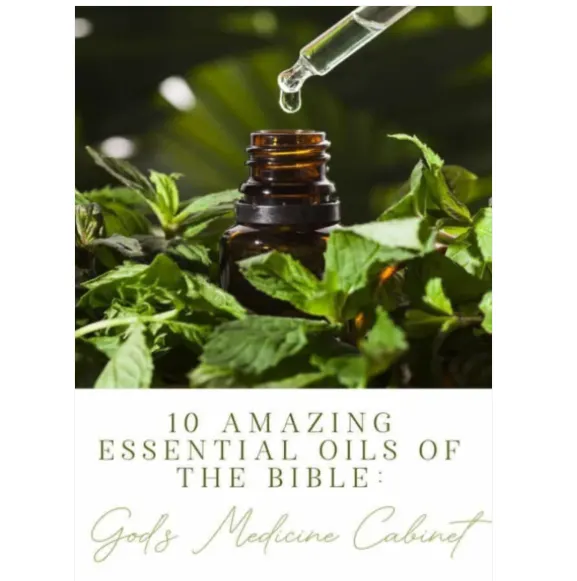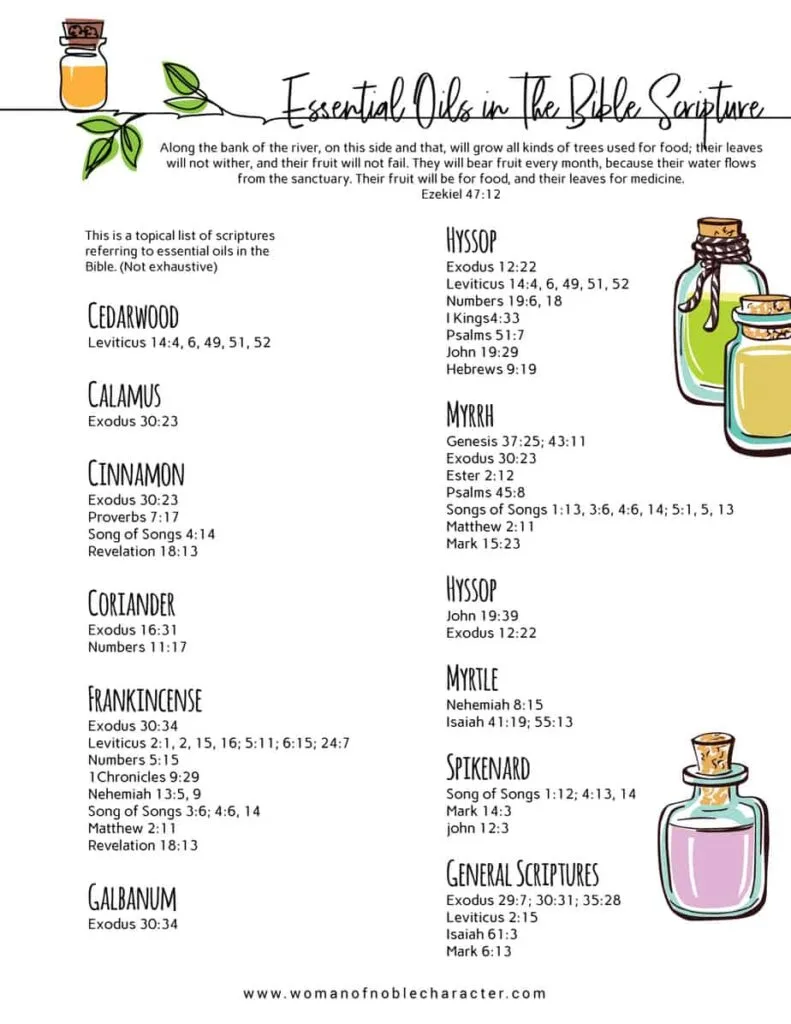This page/post may contain affiliate links. As an Amazon Associate, as well as an affiliate of other programs, this means if you purchase something using these links, I will receive a commission on qualifying purchases at no cost to you! For more detailed information, please visit our Affiliate Disclaimer page
Essential oils are another of the many gifts from God. He, as the Bible states, gave us plants for healing.

In fact, the Bible contains over 200 references to aromatics, incense and ointments.
And on the banks, on both sides of the river, there will grow all kinds of trees for food. Their leaves will not wither, nor their fruit fail, but they will bear fresh fruit every month, because the water for them flows from the sanctuary. Their fruit will be for food, and their leaves for healing.” – Ezekiel 47:12 (ESV)
(See below for a downloadable/printable reference PDF on essential oils of the Bible)
Essential oils are simply the oils of a plant which have been carefully extracted or distilled in a highly concentrated form. Inside the plant, essential oils act as protectors and attractors. So they protect the plant against things that could kill it. They also help attract pollinators that help it to grow.
Learn About God’s Medicine Cabinet
Essential oils of the Bible are gifts from God. In this ebook (grab it now!), we’ll look at 10 biblical oils, their role in scripture, how the oils were used then and now, and videos plus Bible verse download included.
Pure essential oils are those that are not obtained by chemical processes. These oils carry the plant’s constituents, which contain the healing properties.
Essential oils have been the foundation of healing and medical treatment for thousands of years but are not used as frequently with advent of modern of medicine.
Is modern medicine better than the gifts given to us by God. In my opinion, no, but there is a place for both. I use modern medicine (for example, my chemotherapy) in conjunction with essential oils.
There is a strong attraction for many in connecting with our biblical ancestors, and that connection can be a major draw into the world of natural remedies. Knowing that countless generations have turned to the same healing properties is comforting, and even more so when we can connect it to Biblical times and “medicine”. When the God, Himself, gives us plants for healing, we should use them!
With that said, there are conflicting opinions about essential oils of the Bible.
The truth of the matter is that when the magi came to present baby Jesus the gifts of gold, frankincense, and myrrh, they were not oils, but rather resins. Essential oils as we have now simply didn’t exist in biblical times. The essential oils of the Bible that we use today require highly advanced distillation techniques that weren’t yet invented.
Essential oils of the Bible are a component of botanical matter, evident with a simple walk through of a fragrant garden. The aromatic properties escape a rose with merely the touch of a hand. So, there’s little question why or how the ancients would have noticed this and utilized it in some form. Oils themselves are discussed in ancient literature dating back thousands of years, with Rome known for its baths, territories of Greece for their perfumes, and anointing oils mentioned in the Bible.
Largely, these were extracts, with many writings indicating the use of olive oil and pressing the oil out. There are written artifacts which point to crude distillation methods. While these early distilled oils would have been closer to our modern hydrosols – steam distillation that creates an aromatic water – the idea of extracting, distilling, or otherwise capturing and using the fragrant component of a plant has been used since Old Testament days.
Ultimately, as mentioned above, God gave us these plants and thus, essential oils for healing, His own medicine.
Let’s look at some essential oils of the Bible, including how they are used, what they are used for and how to use them now. I’ve also included relevant verses about biblical oils (or at least the plant the oil was derived from).
NOTE: It is important to point out that essential oils are extremely concentrated, 1 drop contains approximately 40 million trillion molecules. We have 100 trillion molecules in our body so 1 drop of oil is enough to cover every cell in our body with 40,000 molecules
The First Mention of Essential Oils of the Bible
Essential oils were first mentioned in the book of Genesis, well, the plants that the oils came from, at least.
So, when Joseph came to his brothers, they stripped him of his robe, the robe of many colors that he wore. And they took him and threw him into a pit. The pit was empty; there was no water in it.
Then they sat down to eat. And looking up they saw a caravan of Ishmaelites coming from Gilead, with their camels bearing gum, balm, and myrrh, on their way to carry it down to Egypt. – Genesis 37:23-25 (ESV)
Later, we read that when Jacob sent his sons into Egypt for food. He told them to take along some myrrh as a gift for the man in charge (Joseph).
Then their father Israel said to them, “If it must be so, then do this: take some of the choice fruits of the land in your bags, and carry a present down to the man, a little balm and a little honey, gum, myrrh, pistachio nuts, and almonds. – Genesis 43:11 (ESV)
Before we begin our dive into essential oils in the Bible, I want to share that I buy all my essential oils from Young Living as their seed to seal process ensures that the oils are of the highest quality and concentration.
The form you have selected does not exist.
To be honest, my medicine cabinet has more essential oils than it does traditional modern medicine.
Ten Essential Biblical Oils
Aloes (Sacred Sandalwood)
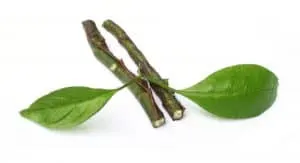
When the Bible refers to aloes, it’s the aromatic extract (or mash) of a tree’s heartwood, used for healing and especially embalming. Old English borrowed the word, then applied it to the spiky plant we know now.
In scripture, sandalwood is referred to as “aloes” and is called one of the oils of joy and gladness along with frankincense, myrrh and cedarwood. Nicodemus and Joseph of Arimathea brought sandalwood (aloes) and myrrh to bury Jesus, and in today’s market, the amount of oils used would be worth an estimated $200,000.
A study at Brigham Young University documented the ability of sandalwood oil to inhibit several types of cancer cells. I currently apply this oil as part of a blend with Frankincense; Elemi, Ledum, Idaho Blue Spruce, Egyptian Gold, Sacred Sandalwood, Grapefruit, Lemongrass, and Myrrh to help fight my own colon cancer.
I find it amazing that so many of the essential oils in the Bible have anti-tumor properties. Yet, so many other things we put into our bodies promote tumor growth.
On a side note: nuts were often mentioned in the Bible and recent studies have shown that 2 ounces of tree nuts eaten weekly reduce the chance of colon cancer recurrence. God is the greatest Healer!
Bible Verses About Aloes or Sacred Sandalwood:
Nicodemus also, who earlier had come to Jesus by night, came bringing a mixture of myrrh and aloes, about seventy-five pounds in weight. – John 19:39 (ESV)
Like palm groves that stretch afar,
like gardens beside a river,
like aloes that the Lord has planted,
like cedar trees beside the waters. – Numbers 24:6 (ESV)
your robes are all fragrant with myrrh and aloes and cassia.
From ivory palaces stringed instruments make you glad; – Psalm 45:8 (ESV)
I have perfumed my bed with myrrh,
aloes, and cinnamon. – Proverbs 7:17 (ESV)
nard and saffron, calamus and cinnamon,
with all trees of frankincense,
myrrh and aloes,
with all choice spices – Song of Solomon 4:14 (ESV)
Nicodemus also, who earlier had come to Jesus by night, came bringing a mixture of myrrh and aloes, about seventy-five pounds in weight. – John 19:39 (ESV)
Medical Properties of Aloes (Sacred Sandalwood):
antitumoral, antibacterial, antiviral, immune stimulant
Aloes (Sacred Sandalwood) Can be used for:
cancer, viral infections (herpes simplex, herpes zoster, cold sores, human papilloma virus, etc.), skin conditions (acne, wrinkles, scars, etc.), support for reproductive health in women, as an aphrodisiac.
How to use Aloes (Sacred Sandalwood) Essential Oil:
- Diffuse up to one hour three times a day or directly inhale from bottle. May also be taken as a dietary supplement.
- Or topically by applying 2-4 drops on location. (I have my antitumoral property oils in a roller bottle and apply daily to my wrists, over heart, around my liver area and the bottoms of my feet)
- Apply 2–4 drops directly to desired area. Dilution not required, except for the most sensitive skin. Use as needed. Diffuse up to 1 hour 3 times daily.
Cassia:

Unlike the herb Senna, whose proper name begins with Cassia, the cassia of the Bible resembled cinnamon more than anything. According to an etymology breakdown by BibleHub online, cassia is likely “the inner bark of Cinnamomum cassia, a plant growing in eastern Asia closely allied to that which yields the cinnamon of commerce. It is a fragrant, aromatic bark and was probably used in a powdered form.”
An herb very similar to cinnamon, cassia oil is the fourth ingredient listed in the holy anointing oil detailed in Exodus 30:24. It may have been brought out of Egypt when the Israelites fled Pharaoh and was commonly used with myrrh and aloes to scent garments. It is mentioned fifty times in scripture.
Bible Verses About Cassia:
your robes are all fragrant with myrrh and aloes and cassia.
From ivory palaces stringed instruments make you glad; – Psalm 45:8 (ESV)
and 500 of cassia, according to the shekel of the sanctuary, and a hin of olive oil. – Exodus 30:24 (ESV) (as an anointing oil)
and casks of wine from Uzal they exchanged for your wares; wrought iron, cassia, and calamus were bartered for your merchandise. – Ezekiel 27:19 (ESV)
Like cinnamon, cassia is rich in cinnamaldehyde when derived from the bark. If Cassia is not available, cinnamon essential oil would be a comparable substitute.
Medical Properties of Cassia:
anti-inflammatory (COX-2 inhibitor), antifungal, antibacterial, antiviral and anticoagulant.
Cassia Can Be Used for:
cataracts, fungal infections (ringworm, candida), atherosclerosis, anxiolytic, diabetes, arteriosclerosis.
How to Use Cassia Essential oil:
- Diffuse up to 1 hour three time daily or directly inhale.
- Dilute one drop of cassia with 4 drops of a carrier oil, put in a capsule and take 1 daily (or as directed by a health care professional).
- Dilute 1 drop with 4 drops of fractionated coconut oil or olive oil. Test on small area of skin on the underside of arm. Then apply to desired area as needed.
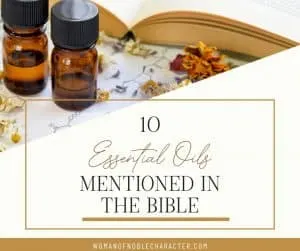
Cedarwood Essential Oil
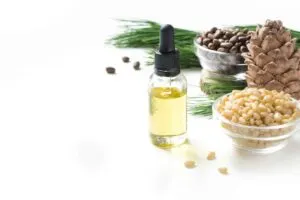
Cedarwood is amazing and has so many wonderful uses. The wood itself is incredibly strong. Even King Solomon used cedarwood to build God’s temple and the cross that Jesus’ was crucified was made of cedarwood or cypress.
In the Bible, we read that cedarwood is thought to bring wisdom, was used for ritual cleansing and served as medicine in treating skin conditions and leprosy.
Mentioned most as a burned wood for ceremonial purposes, cedarwood is associated with cleansing and purification.
It is mentioned twenty-five times in scripture.
Bible Verses About Cedarwood
“the priest shall command them to take for him who is to be cleansed two live clean birds and cedarwood and scarlet yarn and hyssop.” – Leviticus 14:4 (ESV)
The righteous flourish like the palm tree
and grow like a cedar in Lebanon. – Psalm 92:12 (ESV)
And the priest shall take cedarwood and hyssop and scarlet yarn, and throw them into the fire burning the heifer. – Numbers 19:6 (ESV)
Like palm groves that stretch afar,
like gardens beside a river,
like aloes that the Lord has planted,
like cedar trees beside the waters. – Numbers 24:6 (ESV)
Medical Properties of Cedarwood:
Combats hair loss, antibacterial, lymphatic stimulant
Cedarwood Can be Used For:
Hair loss, arteriosclerosis, ADHD, skin problems (acne, eczema), clarity/clearing “brain fog”
How to Use Cedarwood Essential oil:
- Apply 2–4 drops directly to desired area. Dilution not required, except for the most sensitive skin. Use as needed.
- Diffuse up to 1 hour 3 times daily
- Take as a dietary supplement
Cypress Essential Oil
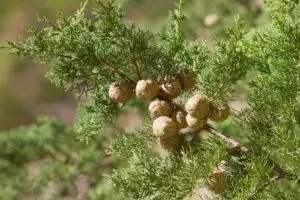
Mostly mentioned along with cedar, cypress is celebrated in the Scripture as a symbol of strength and security. It is also known as “gopherwood”.
Cypress is the chosen translation likely due to the Mediterranean cypress (Cupressus sempervirens), an evergreen from which we derive an essential healing oil. Known simply as cypress oil, it is comprised largely of pinene and limonene and is an effective antibacterial essential healing oil.
This biblical oil is extracted from the cypress tree, which has wood so durable that the cypress doors of Rome’s St. Peter’s Basilica show no sign of decay even after 1,200 years. It was also used to build the ark and Jesus’ cross.
Gopherwood (Cypress) is mentioned in the Bible as a building material, fragrance, weaponry material, healing and a symbol of prosperity.
The Hebrew word for Cypress is “Tirzah”.
Bible Verses About Cypress
Make yourself an ark of gopher wood. Make rooms in the ark, and cover it inside and out with pitch. – Genesis 6:14 (ESV)
He cuts down cedars, or he chooses a cypress tree or an oak and lets it grow strong among the trees of the forest. He plants a cedar and the rain nourishes it. – Isaiah 44:14 (ESV)
The glory of Lebanon shall come to you,
the cypress, the plane, and the pine,
to beautify the place of my sanctuary,
and I will make the place of my feet glorious. – Isaiah 60:13 (ESV)
O Ephraim, what have I to do with idols?
It is I who answer and look after you.
I am like an evergreen cypress;
from me comes your fruit. – Hosea 14:8 (ESV)
The shield of his mighty men is red;
his soldiers are clothed in scarlet.
The chariots come with flashing metal
on the day he musters them;
the cypress spears are brandished. – Nahum 2:3 (ESV)
Medical Properties of Cypress
Improves circulation; is anti-infectious, antispasmodic, and an antioxidant; discourages fluid retention; improves respiration; promotes liver health
Cypress Can be Used for:
Diabetes, circulatory disorders, grounding, stabilizing, provides emotional support (grief, etc.)
How to Use Cypress Essential Oil
- Diffuse up to 1 hour three times daily or directly inhale
- Apply 2–4 drops directly to desired area. Dilution not required, except for the most sensitive skin. Use as needed.
- Take as a dietary supplement
Frankincense Essential Oil

The Hebrew word for frankincense, levonah, is used in the Bible 22 times, making it one of the most recognized materials in scripture.
Also known as “olibanum”, the name Frankincense is derived from the medieval French word for “real incense”.
As a healing remedy, frankincense oil is not only antimicrobial but also an immunostimulant. God, in all His wisdom, could have been protecting His priests (and Son!) through the use of Frankincense.
One of the most important of essential oils in the Bible, it has many uses and is proven, by science, to be a natural healer. It is also one of my favorite biblical oils due to the Bible stories associated with it and its numerous uses.
Frankincense is the king of the oils. It was used as a primary component of the holy incense, a medicine and a currency — and of course, it was a gift from the wise men to baby Jesus. In fact, at the time of Jesus’ birth, both frankincense and myrrh may have been worth more than their weight in the third gift: gold.
Christians know Frankincense best as one of the gifts given to baby Jesus as part of the Christmas story, but frankincense is currently also thought to promote skin cellular health and build a healthy immune system.
The Bible mentions frankincense is used as part of a holy ritual as an incense. People claimed frankincense had more worth than gold. It was used as a natural healer, and an aid to heal almost any disease that plagued people during that time. Today, frankincense is also used to boost immunity, shrink tumors, and decrease inflammation.
Sons of Kings (including Jesus!) were anointed with Frankincense when they were born.
In biblical times, most healers traveled with Frankincense.
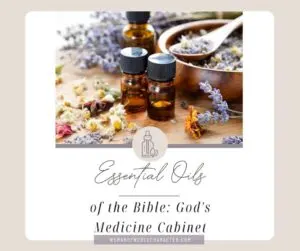
Bible Verses About Frankincense
What is that coming up from the wilderness
like columns of smoke,
perfumed with myrrh and frankincense,
with all the fragrant powders of a merchant? – Song of Solomon 3:6 (ESV)
The Lord said to Moses, “Take sweet spices, stacte, and onycha, and galbanum, sweet spices with pure frankincense (of each shall there be an equal part), and make an incense blended as by the perfumer, seasoned with salt, pure and holy. You shall beat some of it very small, and put part of it before the testimony in the tent of meeting where I shall meet with you. It shall be most holy for you. – Exodus 30:34-36 (ESV)
And going into the house, they saw the child with Mary his mother, and they fell down and worshiped him. Then, opening their treasures, they offered him gifts, gold and frankincense and myrrh. – Matthew 2:11 (ESV)
A multitude of camels shall cover you,
the young camels of Midian and Ephah;
all those from Sheba shall come.
They shall bring gold and frankincense,
and shall bring good news, the praises of the Lord. – Isaiah 60:6
cinnamon, spice, incense, myrrh, frankincense, wine, oil, fine flour, wheat, cattle and sheep, horses and chariots, and slaves, that is, human souls. – Revelation 18:13 (ESV)
Medical Properties of Frankincense
Antitumoral, immune-stimulant, antidepressant, muscle relaxing
Frankincense Can be Used For
Great as a healing oil from head-to-toe; Depression, cancer, respiratory infections, inflammation, immune stimulating, spiritual renewal
How to Use Frankincense Essential Oil:
- Place 2-4 drops of oil directly onto the part of the body in need of healing.
- Diffuse up to 1 hours three time daily or directly inhale
Hyssop Essential Oil

Also nicknamed the “holy herb”, Hyssop is another of the most recognized biblical oils, In the Old Testament, God commanded His people to use hyssop in the ceremonial cleansing of people and houses. Hyssop appears at Jesus’ crucifixion, when the Roman soldiers offered Jesus a drink of wine vinegar on a sponge at the end of a stalk of hyssop.
It was also used for branches in the first Passover.
In Biblical times, hyssop grew in Egypt, in the desert of Sinai, and in Palestine. Today, it is derived from the plant Hyssopis Officinalis currently found here in the United States (Utah) as well as France and Hungary. Hyssop was used in ceremonial offerings and cleanings, and one of the ingredients in the sponge used to soak up sour wine given to Jesus on the cross. It represents the freedom and forgiveness of the Gospel; pointing to the atoning death of Jesus.
Bible Verses About Hyssop
Take a bunch of hyssop and dip it in the blood that is in the basin, and touch the lintel and the two doorposts with the blood that is in the basin. None of you shall go out of the door of his house until the morning. – Exodus 12:22 (ESV)
“Purge me with hyssop, and I shall be clean; Wash me, and I shall be whiter than snow”. – Psalm 51:7 (ESV)
A jar full of sour wine stood there, so they put a sponge full of the sour wine on a hyssop branch and held it to his mouth. – John 19:29 (ESV) (This was the sponge that soaked up the sour wine that was given to Jesus on the cross)
Medical Properties of Hyssop
mucolytic, decongestant, anti-inflammatory, to regulate lipid metabolism, antiviral, antibacterial and antiparasitic
Hyssop Can be Used For
Used to help with respiratory infections/congestion, parasites (expelling worms), viral infections and circulatory disorders, calming anxiety, bringing feelings of oneness with God
How to Use Hyssop Essential Oil
- Diffuse up to 10 minutes three times a day or directly inhale from bottle
- Can also be taken as a dietary supplement or topical. If used topically, dilute 1 drop of hyssop with 1 drop of carrier oil and apply to effected location.
- Create a balm by adding hyssop essential oil to shea butter and rub all over your feet for overall health and well-being.
Myrrh Essential Oil
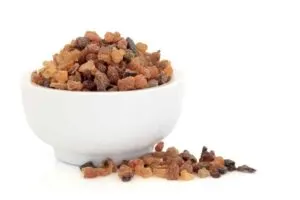
Myrrh is mentioned in the scripture 156 times making it one of the most recognizable essential oils in the Bible.
Uses of myrrh oil in the Bible included use as an ointment, an incense, an embalming ingredient and as a skin beauty treatment by Queen Esther. By far, myrrh’s most common usage in the Bible is as a part of holy anointing oil.
Not only was myrrh used as a gift to the baby Jesus, myrrh is known as a highly valued and desired oil. It is listed in Dr. Wighard Strehlow’s book Medicine, which highlights early medicines compiled by Hildegard of Bingen (who lived from 1098-1179).
Myrrh was one of the key ingredients in Moses’s holy anointing oil and highly regarded by biblical figures such as David and Solomon.
The Bible mentions myrrh as a part of a daily regimen. Today, myrrh is used as an antibacterial agent. Myrrh is used to control diabetes, but also can be a powerful aid to cure various skin disorders such as eczema and chapped skin as well as cure fungal infections like candida and ringworm.
Interestingly, myrrh and frankincense essential healing oils have a synergistic effect when combined, each improving the others’ antimicrobial benefits.
Bible Verses About Myrrh
Now when the turn came for each young woman to go in to King Ahasuerus, after being twelve months under the regulations for the women, since this was the regular period of their beautifying, six months with oil of myrrh and six months with spices and ointments for women – Esther 2:12 (ESV)
Then they sat down to eat. And looking up they saw a caravan of Ishmaelites coming from Gilead, with their camels bearing gum, balm, and myrrh, on their way to carry it down to Egypt. – Genesis 37:25 (ESV)
Nicodemus also, who earlier had come to Jesus by night, came bringing a mixture of myrrh and aloes, about seventy-five pounds in weight. – John 19:39 (ESV) (Burial preparations Nicodemus used for Jesus’ in the tomb)
I arose to open to my beloved,
and my hands dripped with myrrh,
my fingers with liquid myrrh,
on the handles of the bolt. – Song of Solomon 5:5 (ESV)
I have perfumed my bed with myrrh,
aloes, and cinnamon. – Proverbs 7:17 (ESV)
“Take the finest spices: of liquid myrrh 500 shekels, and of sweet-smelling cinnamon half as much, that is, 250, and 250 of aromatic cane,…” – Exodus 30:23 (ESV) (as an anointing oil)
I came to my garden, my sister, my bride,
I gathered my myrrh with my spice,
I ate my honeycomb with my honey,
I drank my wine with my milk. –
Song of Solomon 5:1 (ESV) (A mix with mixed edible spices to be eaten)
Medical Properties of Myrrh
Powerful antioxidant, antitumoral, anti-inflammatory, antibacterial, antiviral, antiparasitic, analgesic/anesthetic
Myrrh Can be Used For
Diabetes, cancer hepatitis, fungal infections (candida ringworm), tooth/gum infections, skin conditions (eczema, chapped, cracked, wrinkles, stretch marks), arthritis, digestive problems, support emotional healing, a “fixative” oil meaning that it is used to enhance other oils when used together.
How to Use Myrrh Essential Oil
- Diffuse up to 30 minutes three times a day or directly inhale from the bottle
- Dilute 1 drop of myrrh with a carrier oil and apply on affected location
- Create a lotion using beeswax and shea butter. Add 2-4 drops of the oil and mix well. Apply directly onto the skin irritation. Do this until the skin condition improves.
Myrtle Essential Oil
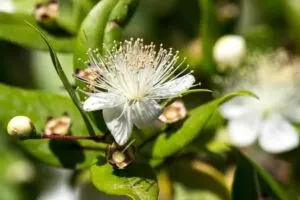
Myrtle isn’t mentioned nearly as often as other biblical oils, but it is said to signify growth and abundance. It likely refers to the Myrtus communis plant, which is grown around Jerusalem to this day.
Myrtle is a low-growing plant with flowers that produce an intense, lovely aroma. It originated in the Middle East and Mediterranean regions. At one time, myrtle was common throughout Palestine and Lebanon. Today, in Israel, most myrtle is grown intentionally for ornamental purposes; however, some still grow wild in Upper Galilee and Golan.
It is frequently used as a perfume, but God used the trees as a part of the prophet Zechariah’s vision and as a prophetic picture of God’s promised blessings.
This is said to be the meaning of Esther’s Hebrew name – and she would have likely enjoyed her namesake as a perfume in the king’s palace!
Many biblical scholars believe that Myrtle was used to heal and anoint the vocal chords of the singers in Solomon’s temple.
Sukkot, commonly translated as Feast of Tabernacles, includes myrtle branches in its ceremony.
Today, the essential healing oil specifically has undergone a fair amount of research, revealing itself as antimicrobial and an antioxidant, among other health benefits.
Bible Verses About Myrtle
“I saw in the night, and behold, a man riding on a red horse! He was standing among the myrtle trees in the glen, and behind him were red, sorrel, and white horses. 9 Then I said, ‘What are these, my lord?’ The angel who talked with me said to me, ‘I will show you what they are.’ 10 So the man who was standing among the myrtle trees answered, ‘These are they whom the Lord has sent to patrol the earth.’” – Zechariah 1:8-10 (ESV)
and that they should proclaim it and publish it in all their towns and in Jerusalem, “Go out to the hills and bring branches of olive, wild olive, myrtle, palm, and other leafy trees to make booths, as it is written.” – Nehemiah 8:15 (ESV)
I will put in the wilderness the cedar,
the acacia, the myrtle, and the olive.
I will set in the desert the cypress,
the plane and the pine together, – Isaiah 41:19 (ESV)
Instead of the thorn shall come up the cypress;
instead of the brier shall come up the myrtle;
and it shall make a name for the Lord,
an everlasting sign that shall not be cut off.” – Isaiah 55:13(Instead of being “choked out”, God’s people will have space to physically and spiritually breathe)
Medical Properties for Myrtle
Antimutagenic, liver stimulant, prostate and thyroid stimulant, sinus/lung decongestant, antispasmodic, antihyperglycemic, anti-inflammatory, antinociceptive
Myrtle Can be Used For
Thyroid problems, throat/lung/sinus infections, prostate problems, skin irritations (acne, blemishes, bruises, oily skin, psoriasis, etc.), muscle spasms
How to Use Myrtle Essential Oil
- Use a carrier oil such as olive oil to create a roll-on containing myrtle. Rub the roll-on mixture directly on the bottom the neck to stimulate the thyroid gland.
- Diffuse up to 30 minutes 3 times per day, inhale directly or put in humidifier
- Take as a dietary supplement
Onycha Essential Oil
Perhaps the most obscure of the biblical oils in this article, onycha was mentioned in the holy anointing oil “recipe” and nowhere else.
While some sources claim onycha is the resin of the Styrax benzoin tree, there is little proof to substantiate the claim. Others attribute it to balsam or laudanum, a fragrant flowering plant.
Onycha was an ingredient in the “pure and holy” perfume or incense the Lord commanded Moses to make.
It is an oil so thick it may not pour from the bottle. It smells similar to vanilla as it contains vanillin aldehyde.
The high acid content of this oil provides it strong antimicrobial properties. Dissolved in ethyl alcohol, it has been used for more than 200 years as “Tincture of Benzoin,” as an effective hospital antiseptic.
With today’s virulent and resistant strains of bacteria against which there are no pharmaceutical defenses, some hospitals are rediscovering the effectiveness of this tincture. Vanillin aldehyde gives onycha its characteristic vanilla aroma. Also called: “Benzoin,” “Friar’s Balsam,” and “Java Frankincense.”
Bible Verses About Onycha
The Lord said to Moses, “Take sweet spices, stacte, and onycha, and galbanum, sweet spices with pure frankincense (of each shall there be an equal part), – Exodus 30:34 (ESV)
Medical Properties of Onycha
Supports the cardiovascular system, emotional and skin health, soothe the discomforts of pre-menstrual syndrome.
Onycha Can be Used For
Perfume, blended in holy incense, comforting, soothing, uplifting, an ointment to heal skin wounds. Used as a fixative. (That’s how thick it is!)
How to Use Onycha Essential Oil
- Apply 2–4 drops directly to desired area. Dilution not required, except for the most sensitive skin. Use as needed.
- Diffuse up to 30 minutes 3 times daily.
Spikenard
While mentioned just five times in scripture, this essential oil of the Bible has a prominent place in biblical history. It is the oil used by Mary of Bethany to anoint the feet of Jesus before the Last Supper. It was an act of service and love to anoint the feet or head with oil. It shows the deep devotion Mary had for the Lord.
Spikenard,from which the ointment or oil was made, was an aromatic herb of the valerian family (Nardostachys jatamansi). It was imported since before Jesus’ ministry Arabia India and the Far East. The costliness of Mary’s offering (300 pence=) may beat be seen from the fact that a penny (denarius, 15 to 17 cents) was in those days the day-wages of a laborer.
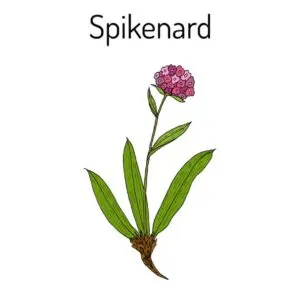
Bible Verses About Spikenard
Mary therefore took a pound of expensive ointment made from pure nard (Spikenard), and anointed the feet of Jesus and wiped his feet with her hair. The house was filled with the fragrance of the perfume. – John 12:3 (ESV)
While the king sitteth at his table, my spikenard sendeth forth the smell thereof. – Song of Solomon 1:12 (KJV)
Thy plants are an orchard of pomegranates, with pleasant fruits; camphire, with spikenard, – Song of Solomon 4:13 (KJV)
Spikenard and saffron; calamus and cinnamon, with all trees of frankincense; myrrh and aloes, with all the chief spices: – Song of Solomon 4:14 (KJV)
And being in Bethany in the house of Simon the leper, as he sat at meat, there came a woman having an alabaster box of ointment of spikenard very precious; and she brake the box, and poured it on his head – Mark 14:3
Medical Properties of Spikenard
Antibacterial, antifungal, antiinflammatory, antioxidant, relaxant, immune stimulant
Spikenard Can be Used For
Insomnia, menstrual problems/PMS, heart arrhythimias, nervous tension, nourishing and regenerating the skin
How to Use Spikenard Essential Oil
- Diffuse up to one hour three times per day or directly inhale
- Take as a dietary supplement
- Apply directly by dropping 2-4 drops of oil on affected area
Rose of Sharon (Cistus) Essential Oil
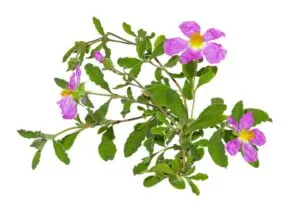
Rose of Sharon (Cistus): This “rock rose” has a sweet, honey-like scent.
Mentioned in the Song of Solomon, the rose of Sharon is not really a “rose” but instead like the hibiscus or tulip (which is also a source of saffron).
It is believed that this essential oil of the Bible was used by shepherds to help heal the cuts and scrapes of sheep and goats.
It has been said that the “Rose of Sharon” first appeared in the 1611 King James Version of the Bible.
Some biblical scholars believe that the rose of Sharon metaphorically is Christ and the lily, the church, His bride.
Bible Verses About Rose of Sharon (Cistus)
I am a rose of Sharon,
a lily of the valleys. – Song of Solomon 2:1
Medical Properties of Rose of Sharon (Cistus)
Antiviral, antibacterial, antihemorrhagic, anti-inflammatory, supports sympathetic nervous system, immune stimulant
Rose of Sharon (Cistus) Can Be Used For
Hemorrhages, arthritis, tremors
How to use Rose of Sharon (Cistus) Essential Oil
- Diffuse up to 1 hour 3 times daily or directly inhale
- Take 4 drops as a dietary supplement
- Apply 2-4 drops on affected location
Other Essential Oils in the Bible
- Anise
- Balm (Balsam)
- Bay (Bay Laurel)
- Bdellium
- Calamus (Cane)
- Cinnamon
- Coriander
- Cumin
- Dill
- Fir
- Galbanum
- Henna
- Juniper
- Mint
- Mustard Seed
- Myrtle
- Onycha
- Pine
- Rose of Isaiah
- Rue
- Saffron
- Shittah
- Spikenard
- Terebinth
- Wormwood
Anointing with Biblical Oils
Is anyone among you sick? Let him call for the elders of the church, and let them pray over him, anointing him with oil in the name of the Lord. – James 5:14
While not all biblical oils of are identifiable, available, or used now as they were then, the study of ancient botanical preparations is fascinating. When we see threads of benefit – antimicrobials as anointing or temple oils, for example, keeping the population healthy – we begin to deepen our understanding of creation and the order that God set into place.
The anointing oil, for example, contains fragrant ingredients that would contain at least some of the essential oils of the Bible no matter how it was produced.
The Lord said to Moses, “Take the finest spices: of liquid myrrh 500 shekels, and of sweet-smelling cinnamon half as much, that is, 250, and 250 of aromatic cane, and 500 of cassia, according to the shekel of the sanctuary, and a hin of olive oil. And you shall make of these a sacred anointing oil blended as by the perfumer; it shall be a holy anointing oil. With it you shall anoint the tent of meeting and the ark of the testimony, and the table and all its utensils, and the lampstand and its utensils, and the altar of incense, and the altar of burnt offering with all its utensils and the basin and its stand. You shall consecrate them, that they may be most holy. Whatever touches them will become holy. – Exodus 30:22-29 (ESV)
For your own fragrant, anointing oil, combine these biblical oils and carrier oil. The antimicrobial and immune effects, fragrance, and connection to sacred rituals of long ago make a perfect combination to carry you through your day healthy and at peace.
1 tbsp olive oil (or other liquid carrier, such as fractionated coconut oil)
2 drops myrrh
2 drops cinnamon (for the cinnamon and cassia)
2 drops sweet orange (for the sweet reed calamus)
1 drop frankincense (for good measure!)
Diffuse this anointing oil periodically or apply topically in sparing amounts when praying over people.
Click the image below for a free two-page PDF on biblical oils in scripture.
In this post on praying over your home, I also share about anointing your home.
You may enjoy this short video, by Dr. Axe, authority on essential oils and biblical oils:
Young Living (my go-to oil source) offers Oils of Ancient Scripture™. It contains 10 biblical oils from the most significant plants, botanicals, materials, and resins in the Bible.
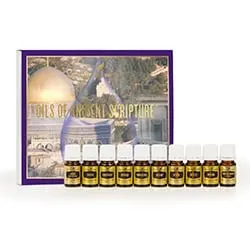
You may also enjoy Spices of the Bible.
Because He Lives,
Sue

